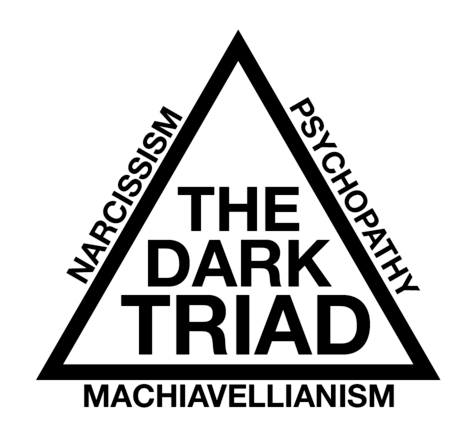The Dark Triad: Why we love to empower Machiavellian Psychopathic Narcissists

Let’s start with some definitions:
…the employment of cunning and duplicity in statecraft or in general conduct
The psychopath can appear normal, even charming. Underneath, they lack conscience and empathy, making them manipulative, volatile and often (but by no means always) criminal. They are an object of popular fascination…
the pursuit of gratification from vanity or egotistic admiration of one’s own attributes.
The dark triad is a group of three personality traits: narcissism, Machiavellianism and psychopathy. Use of the term “dark” implies that people scoring high on these traits have malevolent qualities.
—
Psychiatrists identify the Dark Triad as a set of mental illnesses, where those most severely affected usually end up in jail. Those with more mild cases, however, often become very successful:
…they are often socially adept, and can make very good first impressions. For example, they do better on job interviews than normal people, advantaged by their lack of anxiety about the opinions of others, and greater willingness to show off their strengths to strangers while playing it smooth and comfortable.
Humans are inherently tribal. Most people are built to follow leaders and are most comfortable when surrounded by other followers who avoid challenging tribal dogma. Hence, the echo chambers we see on social media. When tribal dogma gets challenged, people feel threatened; they enter “fight or flight” mode and find themselves compelled to protect their tribe from warring armies that may destroy it.
All of us do this.
You may be thinking of a particular religion or political party with its Dark Triad leaders, but if you step back and think for a moment (e.g. examine your own friends, social media feeds, etc…), you’ll recognize your own tribes and tribal leaders. A good (and normally harmless) example is your favorite sport teams. You probably have friends who paint themselves in tribal colors, wrap themselves in tribal garments, pound drums, wave flags, and chant during gatherings. Personally, I’m a Sounder ’til I die, and a diehard 12 (notice the language we use). As long as our gladiators perform well for our tribe, we love to reward them with our ticket and merchandise purchases, social media shares and comments, etc…
You may wonder how on earth certain tribes and their dogmatic Kool-Aid still exist, especially the most dangerous ones. However, to put on your empathy hat for a moment and imagine being born where they were born, raised in the family they were raised in, influenced by the friends and leaders they were influenced by, etc. It’s not hard to imagine how certain religious, political, and militant groups around the world get formed. Combine this with genetic dispositions, wars and life tragedies, and generational cycles of violence and tribal dogma, and you start to realize how the overlapping tribal mess we find ourselves in can be explained.
Personally, as an ENTJ in the Myers-Briggs world, many people afflicted with Dark Triad personalities are understandably in my camp, and I’ve unfortunately fallen into the trap of working with and/or trusting these crazy people multiple times throughout my life. You think I’d learn. While I can spot ’em a mile away now and at least try to be aware of the Kool-Aid I choose to drink, it’s still a struggle; it’s easy to crawl into an echo-chamber and surround myself with “my people.” What’s hard is to intentionally NOT do this and actually be open to changing my mind and life.
Tim Urban describes this struggle brilliantly:
As far as society is concerned, when you give something a try — on the values front, the fashion front, the religious front, the career front — you’ve branded yourself. And since people like to simplify people in order to make sense of things in their own head, the tribe around you reinforces your brand by putting you in a clearly-labeled, oversimplified box.
What this all amounts to is that it becomes very painful to change. Changing is icky for someone whose identity will have to change along with it. And others don’t make things any easier. Blind tribe members don’t like when other tribe members change — it confuses them, it forces them to readjust the info in their heads, and it threatens the simplicity of their tribal certainty. So attempts to evolve are often met with opposition or mockery or anger.
Thus, the most influential tribal leaders, armed with their manipulation, thirst for power, and lack of empathy, are often found reinforcing such mockery and anger. Marketers have known for ages that controversial statements are attractive, which explains why people who don’t lose sleep over saying controversial things end up in power. We love it. We’re entertained by it. We call them brave. We cheer them on as they lead and represent our tribe.
The sad truth is this story will continue to repeat itself unless we stop empowering our Dark Triad overlords.
What fuels them is our social media buzz, our wallets, and our votes. The question is, by nature of how we are wired, is it even possible to avoid this phenomenon? Unfortunately, I think not. The best we can do it setup systems that prevent Dark-Triad-y people from gaining too much power. This has of course been attempted many times throughout history, but — as we feel acutely these days — we have a long way to go.